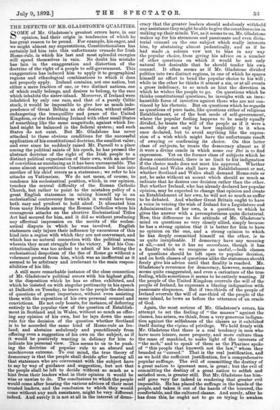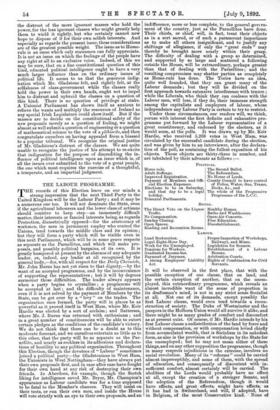THE DEFECTS OF MR. GLADSTONE'S QUALITIES S OME of Mr. Gladstone's
greatest errors have, in our opinion, had their origin in tendencies of which he has great reason to be proud. For example, his eager, and we might almost say superstitious, Constitutionalism has certainly led him into this unfortunate crusade for Irish Home-rule, in which his last and most splendid energies will spend themselves in vain. No doubt his mistake has lain in the exaggeration and distortion of the doctrine of the right of a people to self-government. This exaggeration has induced him to apply it to geographical regions and ethnological combinations to which it does not properly apply. Ireland contains, not one nation, but either a mere fraction of one, or two distinct nations, one of which really belongs, and desires to belong, to the race which inhabits the sister-island. Moreover, if Ireland were inhabited by only one race, and that of a purely Celtic stock, it would be impossible to give her as much inde- pendence of Great Britain as she desires, without either endangering the tranquillity and peace of the United Kingdom, or else federating Ireland with other small States of something like the same magnitude, against which Ire- land might be balanced in the federal system; and such States do not exist. But Mr. Gladstone has never attached to these obvious conditions for the successful application of his constitutional doctrine, the smallest value; and ever since he suddenly raised Mr. Parnell to a place among the political saints of his epoch, he has pressed the abstract doctrine of the right of the Irish people to a distinct political organisation of their own, with an ardour of conviction as unrelaxing as it has been unreasonable. The same almost superstitious Constitutionalism led him into another of his chief errors as a statesman ; we refer to his attacks on Vaticanism. We do not mean, of course, to condemn his ecclesiastical position, which, in our opinion, touches the central difficulty of the Roman Catholic Church, but rather to point to the mistaken policy of a great English statesman in mixing himself up in an ecclesiastical controversy from which it would have been both easy and prudent to hold aloof. It alienated him from many friends among the Roman Catholics whom his courageous attacks on the abortive Ecclesiastical Titles Act had secured for him, and it did so without producing any effectual impression on the merits of the ecclesi- astical dispute in which he was involved. English statesmen only injure their influence by excursions of this kind into a region with which they are not conversant, and which has no natural connection with the political arena wherein they must struggle for the victory. But his Con- stitutionalism was too ardent to admit of his letting the ecclesiastical despotism of the See of Rome go without a vehement protest from him, which was as ineffectual as it seemed to be arbitrary and irrelevant to the main respon- sibilities of his life.
A still more remarkable instance of the close connection of Mr. Gladstone's political errors with his highest gifts, is the disposition which he has so often exhibited, and which he insisted on with singular pertinacity in his speech at Dalkeith on Tuesday, to leave to the people the decision of questions of great importance, without even assisting them with the exposition of his own personal counsel and convictions. He not only boasts, for instance, of deferring entirely to the popular view of the question of Establish- ment in Scotland and in Wales, without so much as offer- ing any opinion of his own, but he lays down the same rule for the decision of the question whether Scotland is to be accorded the same hind of Home-rule as Ire- land, and abstains sedulously and punctiliously from offering even a suggestion of his own on the subject, as if it would be positively wanting in delicacy for him to indicate his personal view. This seems to us to be push- ing the doctrine of popular rule to an absurd and mischievous extreme. To our mind, the true theory of democracy is that the people shall decide after hearing all that statesmen who are conversant with the subject have to say by way of guidance and suggestion, but not that the people shall be left to decide without so much as a hint from their leaders whatin their opinion it would be wise or unwise to do. The conclusions to which the people would come after hearing the various advices of their most trusted leaders, and the conclusion to which they would come without any such assistance, might be very different indeed. And surely it is not at all in the interest of demo- cracy that the greater leaders should sedulously withhold any assistance they might be able to give the constituencies in making up their minds. Yet, as it seems to us, Mr. Gladstone makes up for his strenuous and passionate and even dicta- torial counsel on the one subject which really interests him, by abstaining almost pedantically, and as if he had made ,a solemn vow not to bias in any way the popular choice, from giving his advice on a number of other questions on which it would be not only natural but desirable that he should tender his own counsel. It often seems as if Mr. Gladstone divided politics into two distinct regions, in one of which he spares himself no effort to bend the popular choice to his will ; while in the other he thinks it almost a sin, or at all events a gross indelicacy, to so much as hint the direction in which he wishes the people to go. On questions which he thinks constitutional questions, he inveighs with an inex- haustible force of invective against those who are not con- vinced by his rhetoric. But on questions which he regards as questions of pure taste, like questions either of religious Establishment, or of the best mode of self-government, where the popular feeling happens to be nearly equally divided, he treats the will of the people as if it were a sacred duty not only to bow implicitly to it when once declared, but to avoid anything like the expres- sion of a wish which might have the unfortunate result of swaying or confirming its choice. On this latter class of subjects, he treats the democracy almost as if it were a divine oracle in which some vox Dei is to find expression. Yet on the former class of subjects which he deems constitutional, there is no limit to his indignation if the choice made does not meet his approval. 'Whether Scotland and Wales shall have an Establishment or not, whether Scotland and Wales shall demand Home-rule or not, he asks without an accent which should so much as indicate that he desires one decision rather than the other. But whether Ireland, who has already declared her popular opinion, may be expected to change that opinion and create an Establishment of her own, he will not so much as suffer to be debated. And whether Great Britain ought to have a voice in vetoing the wish of Ireland for a Legislature and Administration of her own, is a question to which he gives the answer with a peremptoriness quite dictatorial. Now, this difference in the attitude of Mr. Gladstone's mind on questions so very closely allied, simply because he has a strong opinion that it is better for him to have no opinion on the one, and a strong opinion to which he has deeply committed himself on the other, is te us quite inexplicable. If democracy have any meaning at all,—and to us it has no sacredness, though it has a finality which we recognise as useful,—both classes of questions should be left open to popular decision, and on both classes of questions alike the statesman should freely give his advice until that finality is reached. Mr. Gladstone's reverence for democracy, however, sometimes seems quite exaggerated, and even a caricature of the true feeling, while sometimes it seems to be entirely wanting. If the people of the United Kingdom overrule the will of the people of Ireland, he expresses a blazing indignation with passionate eloquence. But if two-thirds of the people a Ireland overrule the will of one-third of the people of the same island, he bows as before the utterance of an oracle of God.
Again, the most serious of Mr. Gladstone's errors, his attempt to set the feeling of "the masses" against the classes, has arisen, we think, from a very generous indigna- tion against the selfishness of the classes as it exhibited itself during the regime of privilege. We hold firmly with Mr. Gladstone that there is a real tendency in men who have more leisure, more property, and more culture than the mass of mankind, to make light of the interests of 'the mob," and to speak of them as the Pharisee spoke of "this people that knoweth not the law," whom they branded as "cursed." That is the real justification, and as we hold the sufficient justification, for a comprehensive popular suffrage. The evil of committing the destiny of a great nation to ignorant men, is great ; but the evil of committing the destiny of a great nation to selfish and satisfied men, is greater still. But Mr. Gladstone has him- self gone very far indeed in rendering that greater evil impossible. He has placed the suffrage in the hands of the people, and taken it out of the hands of the leisured, the comfortable, and the cultured classes. And surely, after he has done this, he ought not to go on trying to awaken the distrust of the more ignorant masses who hold the power, for the less ignorant classes who might greatly help them to wield it rightly, but who certainly cannot now hope to dispose of it for their own selfish interests. And especially as regards the present issue, these considerations are of the greatest possible weight. The issue as to Home- rule is an issue which only statesmen can fully appreciate. It is not an issue on which the feelings of the people have any right at all to an exclusive voice. Indeed, of this we may be sure, that on a fine constitutional question of this kind, educated political intelligence ought to have a very much larger influence than on the ordinary issues of political life. It seems to us that the generous indig- nation which Mr. Gladstone felt, and rightly felt, at the selfishness of class-government while the classes really held the power in their own hands, ought not to impel him to distrust and upbraid the classes on a question of this kind. There is no question of privilege at stake. A Unionist Parliament has shown itself as anxious to relieve the wants and multiply the resources of Ireland as any special Irish Legislature could show itself. But if the masses are to decide on the constitutional safety of the new proposals merely as a question of feeling, we might almost as well submit a question of engineering dr a question of mathematical science to the vote of a plebiscite, and then congratulate ourselves on having appealed from a biassed to a popular tribunal. We recognise the original justice of Mr. Gladstone's distrust of the classes. We are quite unable to recognise the justice of his attempt to re-excite that indignation for the purpose of discrediting the in- fluence of political intelligence upon an issue which is, of all the issues ever submitted to the vote of a great people, the one which most requires the exercise of a thoughtful, a temperate, and an impartial judgment.



















































 Previous page
Previous page